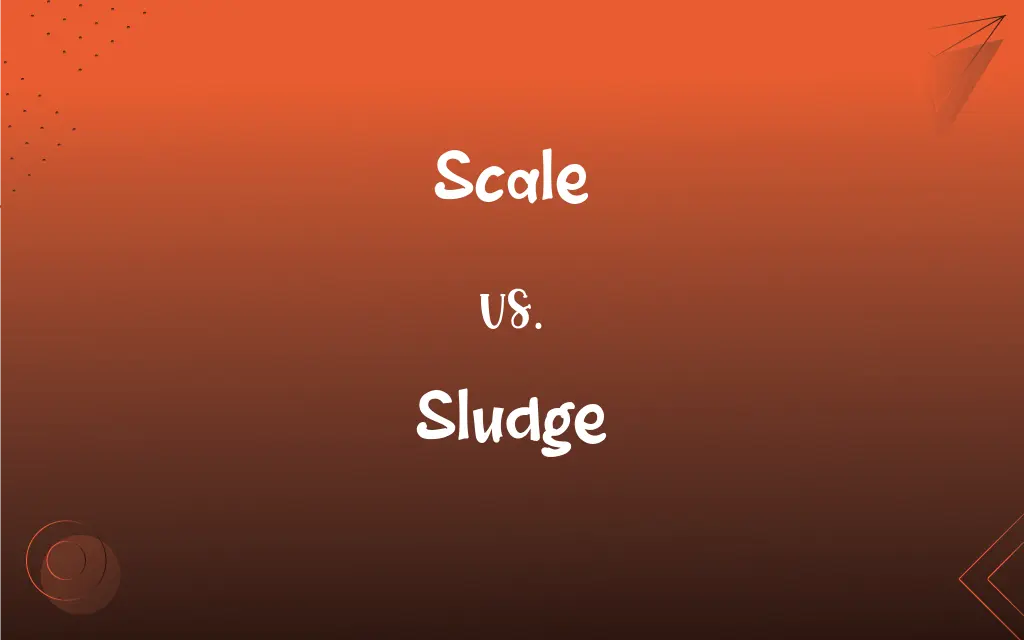Scale vs. Sludge: What's the Difference?
Edited by Aimie Carlson || By Harlon Moss || Updated on November 3, 2023
Scale refers to a series of marks used to measure or rate things, or to the act of climbing; sludge is a thick, soft, wet mixture, often a byproduct of industrial processes.

Key Differences
Scale, in various contexts, denotes a range or series for measurement, or to the act of climbing. Sludge specifically refers to a thick, viscous mixture, often of waste material. Scales are used in mapping or representing values, whereas sludge is the result of combined solids and liquids, frequently unwanted.
Scale implies gradation and progression, such as a musical scale or scaling a mountain. Sludge conveys stagnation and residue, typically needing to be cleaned up or processed. Musical scales ascend and descend in pitches, while sludge accumulates at the bottom of a container.
In biology, scale can refer to small, thin, rigid plates on fish or reptiles, whereas sludge has no biological connotation; instead, it might be the outcome of biological processes in wastewater treatment. A fish’s scales protect its body, while sludge treatment can protect the environment.
The verb "to scale" means to adjust in size according to a set of standards or to climb up a surface. Sludge does not have a verb form and commonly describes a physical substance. Engineers may scale models to a smaller size, whereas they might manage sludge from industrial equipment.
Scale can also refer to the build-up of minerals on appliances, sharing the connotation of unwanted residue with sludge. Despite this overlap, scale in this sense usually forms a hard crust, as opposed to sludge, which remains sloppy and mucky. Water scale can reduce pipe efficiency, just as sludge can impede the operation of sewage systems.
ADVERTISEMENT
Comparison Chart
Definition
A system of ordered marks at fixed intervals used as a reference standard.
A thick, soft, wet mud or a similar viscous mixture of liquid and solid components.
Associated Action
To climb or make proportional adjustments.
No action associated; a byproduct or residue.
Contexts of Use
Measurement, music, biology, mapping.
Waste management, environmental science.
Physical Form
Can be intangible (measurement system) or physical (fish scales).
Always a tangible, viscous substance.
Verb Form
Yes, e.g., to scale a wall.
No verb form.
ADVERTISEMENT
Scale and Sludge Definitions
Scale
A device used for measuring weight.
Place the package on the scale to determine its weight.
Sludge
Thick, soft, wet mud or a similar viscous mixture of liquid and solid components.
After the flood, the streets were covered with sludge.
Scale
A series of musical notes in ascending and descending order.
She practiced the C major scale on her piano.
Sludge
A residue that accumulates at the bottom of a tank or container.
The mechanic cleaned out the sludge from the oil tank.
Scale
The act of climbing or making something proportionate.
He scaled the company to fit the small market size.
Sludge
A genre of music with a heavy, slow, and viscous sound.
They listened to sludge metal bands all night.
Scale
Thin plates covering the skin of certain animals, like fish and reptiles.
The fish's scales glistened in the sun.
Sludge
Semi-solid slurry, often a byproduct of industrial processes or sewage treatment.
The factory's waste treatment process generated a large amount of sludge.
Scale
Mineral deposits formed in boilers and kettles from hard water.
The kettle needs cleaning to remove the limescale.
Sludge
A derogatory term for something deemed worthless or of poor quality.
He described the poorly written report as sludge.
Scale
One of the many small hard dermal or epidermal structures that characteristically form the external covering of fishes and reptiles and certain mammals, such as pangolins.
Sludge
Semisolid material such as the type precipitated by sewage treatment.
Scale
A similar part in other animals, such as one of the thin flat overlapping structures that cover the wings of butterflies and moths.
Sludge
Mud, mire, or ooze covering the ground or forming a deposit, as on a riverbed.
FAQs
Can "sludge" have positive connotations?
Rarely, as it generally refers to unwanted or dirty residue.
Can "scale" be used in a business context?
Yes, it can refer to business growth or expansion.
Does "scale" have a standard size?
Scale is relative and varies according to the system or model.
Can "scale" refer to map representation?
Yes, it indicates the ratio between map distances and actual distances.
Does "sludge" only come from industrial activities?
No, it can also be natural, like the bottom sediments in a pond.
Is "sludge" always associated with pollution?
Often, but it can also just mean a thick, muddy substance.
Are scales on fish similar to sludge?
No, fish scales are protective coverings, unlike waste sludge.
Do all musical instruments use scales?
Most melodic instruments utilize scales as a foundation for music.
Can sludge affect water quality?
Yes, sludge can contaminate water bodies if not properly managed.
Can "sludge" be treated and reused?
Yes, treatment can make sludge reusable, like in composting.
Is it correct to talk about "scaling down" a project?
Yes, it means reducing its size or scope.
Is "sludge" a technical term?
Yes, in environmental science and engineering.
What does "scaling up" mean in a business?
It refers to expanding a business's operations.
Are sludge and sediment the same?
Not exactly; sediment is specifically the matter that settles at the bottom.
Can "scale" be used metaphorically?
Yes, like "scaling new heights" in a career.
Is sludge harmful to the environment?
It can be if it contains toxic substances.
What is done with sludge from water treatment plants?
It's often processed into biosolids or disposed of in landfills.
How do you measure a scale in music?
By the sequence of whole and half steps between notes.
Can scale also mean "to peel"?
Yes, as in scaling fish, it means to remove the scales.
What industries produce the most sludge?
Wastewater treatment, oil, and manufacturing often produce sludge.
About Author
Written by
Harlon MossHarlon is a seasoned quality moderator and accomplished content writer for Difference Wiki. An alumnus of the prestigious University of California, he earned his degree in Computer Science. Leveraging his academic background, Harlon brings a meticulous and informed perspective to his work, ensuring content accuracy and excellence.
Edited by
Aimie CarlsonAimie Carlson, holding a master's degree in English literature, is a fervent English language enthusiast. She lends her writing talents to Difference Wiki, a prominent website that specializes in comparisons, offering readers insightful analyses that both captivate and inform.































































